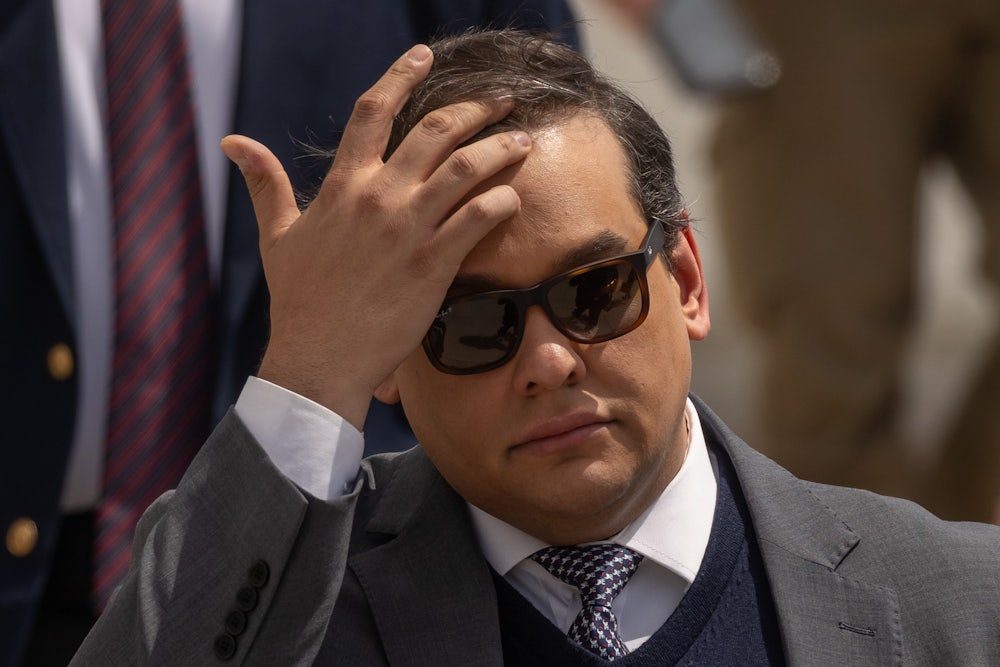George Santos walked free Friday night when President Trump commuted his sentence after he’s served just 84 days of his seven-year sentence—about 3 percent of the term. He may have the distinction of being the most shameless thief and prolific fraudster ever to sit in Congress. Santos pleaded guilty last year to wire fraud and aggravated identity theft for schemes involving campaign funds, false Federal Election Commission filings, and the misuse of donor credit cards. He siphoned thousands in contributions to finance luxury goods and nights out with wealthy Republicans.
His admitted crimes barely skim the surface. Santos has been a sociopathic flimflam man for two decades, leaving victims on two continents—and, in a sense, all of us. From Brazil, where he stole a checkbook from an elderly woman his mother worked for, to Queens and Long Island, he built a life on lies: fake colleges, fake Wall Street jobs, a mother who supposedly died on 9/11, grandparents who fled the Holocaust, a GoFundMe to save a dying service dog whose funds he pocketed. A shameless fraudster who lies about everything and steals from everyone. Sound familiar?
He was in some ways a comic figure. If I had five cards to play to reverse Trump’s unjust acts of clemency, I doubt I’d spend one on Santos. But his crimes were no joke—to the donors he defrauded, to the veteran whose dog died, and especially to the people of New York’s 3rd congressional district, whom he betrayed as their representative. When the scandals forced him out, the district was left voiceless for months—collateral damage in Trump’s ongoing campaign to turn government into an instrument of personal reward and revenge.
Trump’s decision to commute Santos’s sentence turns farce into rot—a corruption of the justice system itself.
Trump didn’t even pretend Santos had been wrongfully convicted. “He was somewhat of a rogue,” Trump said, before praising his “courage, conviction, and intelligence to always vote Republican.” Earlier, Trump explained that he was considering clemency because Santos “lied like hell, but he was 100 percent for Trump.” It was a spectacular pot-kettle moment even by Trump standards, but also a crystal-clear statement of his governing creed: loyalty first, legality last.
Trump’s nominal rationale—that Santos’s sentence was excessive—is preposterous. The sentence was entirely typical for such crimes, and even if it weren’t, commuting it from 87 months to three—and forgiving $370,000 in restitution—is hardly a restoration of proportionality under any view of Santos’s crimes.
But here’s the twist: This outrage might actually be reversible.
In 2019, New York lawmakers anticipated precisely this kind of abuse. After Trump’s pardon of Paul Manafort, the legislature passed, and Governor Cuomo signed, a law closing what became known as the “Manafort loophole.” Before then, New York’s double-jeopardy rule barred state prosecutions based on the same “transaction” as a federal one, even if the federal conviction was later wiped away by a presidential pardon. The new law, however, reverses that and carves out an exception for anyone who had received “a reprieve, pardon, or other form of clemency” from the president.
The statute rests on solid constitutional ground. Under the Supreme Court’s “separate sovereigns” doctrine, state and federal systems draw power from different sources. A federal pardon ends only federal exposure; it doesn’t block state prosecution. The legislative history leaves no doubt that “other form of clemency” includes commutations. New York’s law was designed to ensure that political allies of a president couldn’t evade state justice through federal favors.
That puts George Santos squarely within the statute’s reach. Many of his federally charged acts—lying to donors, diverting campaign funds, falsifying records—also violate New York law. His conduct fits comfortably under state statutes for scheming to defraud, grand larceny, falsifying business records, and identity theft. Several of his victims live in Nassau County, giving local prosecutors clear jurisdiction.
Nassau County District Attorney Anne Donnelly has been down this road. Her office opened an inquiry into Santos in early 2023 after revelations about his fabricated biography and campaign finances. That investigation was paused once federal prosecutors brought their case. Now that Trump has wiped away the federal judgment, she can—and should—reopen it.
Nothing in the Constitution or state law prevents her from doing so, and everything in the public interest argues for it. Santos’s serial deceit, exploitation of donors, and theft of public trust demand a reckoning no presidential flourish can erase.
Trump’s act of clemency distilled his worldview to its essence. Equal justice under law has been replaced by a three-track system: one for Trump’s enemies, one for ordinary Americans, and one for his loyalists. On the first track are the perceived foes—James Comey, Letitia James—targeted with investigations and prosecutions. On the second is everyone else, still bound by the law unless they happen to cross Trump’s path. And on the third are the lickspittles: convicted criminals whose loyalty earns them a get-out-of-jail-free card.
Santos’s fawning open letter to Trump, published in a Long Island newspaper, captured the dynamic perfectly: “I was all in,” he wrote. “I never wavered.… I stood firmly behind your agenda—100 percent of the time, and I did it proudly, Sir.”
Trump’s commutation wasn’t merely a favor to a disgraced ally. It was a declaration that the federal justice system now runs on personal loyalty to him. But New York has both the legal tools and the moral authority to respond. The new law was written for this very scenario.
Trump’s act of mercy stole justice from the citizens of Nassau County whose trust Santos so thoroughly defiled. A state prosecution can restore it. Santos’s story began as a farce. It may not have to end that way.










